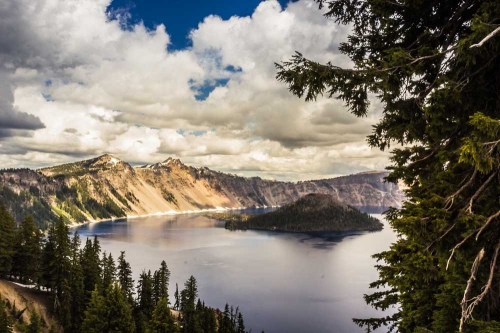Crater Lake’s clear waters threatened by illegal activities
Published 3:00 pm Monday, August 10, 2020

- Wizard Island and the north side of the caldera rim as seen from the Rim Village at Crater Lake National Park.
BEND — Crater Lake, regarded as the cleanest and clearest large body of water in the world, is facing threats of possible contamination because some lake visitors are using illegal items and defecating along its shores.
Crater Lake Superintendent Craig Ackerman is especially concerned that visitors are ignoring signs prohibiting the use of various gear, and that could result in aquatic invasive species and nonnative organisms being introduced into the lake. Rangers are attempting to turn back people with illegal items, “but we can’t have someone there 24 hours a day,” he said.
Trending
The threat to Crater Lake’s water quality tops the list of concerns created by the combination of unexpectedly large numbers of visitors, severe cutbacks in seasonal park staffing because of the COVID-19 pandemic, widespread disregard for social distancing, and people climbing into the lake’s caldera.
“It’s pretty clear people are out and about, and the majority are acting like there’s no pandemic at all,” Ackerman said.
During a recent visit to the Cleetwood Cove parking lot, the starting point for the Cleetwood Trail, the only trail to the lake, he said he saw more than 100 people in the parking lot, but only four wearing masks. Also, no one was following the state-required mandate of 6 feet of social distance separation, he said. Of the 100-plus vehicles in the lot, Ackerman said he counted licenses from 25 different states, including Florida, Texas and Arizona, which are experiencing serious pandemic outbreaks.
Ackerman said park staffing levels are 60% to 70% below normal because of housing shortages stemming from the pandemic. Seasonal units for National Park Service employees and dormitory-type facilities for Aramark concession employees are restricted to housing far fewer people per unit.
Because of staffing shortages, Ackerman said full-time park personnel are being moved from their usual jobs to help with other concerns, including checking for illegal water-related items at the Cleetwood Cove trailhead and cleaning the park’s few open bathrooms. In some cases, some park staff have volunteered during off-hours to assist.
Ackerman said there have been reports of visitors taking and using water rings, inflatable kayaks, inner tubes, small rafts, snorkeling and scuba gear, various flotation devices and even an eight-person raft in the lake. Many people also take dogs, which are banned because they might unknowingly transmit invasive species that could irrevocably contaminate the lake. People are allowed to swim in the Cleetwood Cove area and, when tour boats are opening, at Wizard Island, “using standard swim suits.”
Trending
The Cleetwood Cove bathroom at the parking area-trailhead is open, but the bathroom at the lake is closed because the park lacks staff for the necessary cleaning. Ackerman said some visitors have defecated along the trail and along the lakes and not carried out their solid waste. In addition, the bathroom at the lake was broken into and vandalized. Cigarette butts have been flicked into the lake as well as coffee cups and even underwear.
Ackerman said the situation is complicated because boat tours normally offered during summer months were cancelled because of the pandemic. As a result, staff from Aramark, the park concessionaire, are no longer stationed at the rim parking area or the lake’s boat docks. Likewise, park rangers who normally narrate the boat tours are not at the lake.
“We’re hearing the same story from the state parks, Bureau of Land Management, Forest Service, anyplace there’s outdoor recreation,” Ackerman said of undisciplined, illegal activities. “We’re really not sure what’s causing that.”
Several incidents of illegal climbing in the caldera have been reported, with rangers and outside crews sometimes dispatched in time-consuming, costly rescues. Seven people were cited Friday after illegally climbing inside the caldera and triggering a large search effort.
At the Mazama Campground, Ackerman said groups of 50 to 75 people have been flaunting social guidelines by gathering for potlucks and other activities.
Despite often flagrant disregard for park rules, especially the possible introduction of invasive species into the lake, Ackerman is hopeful, noting, “Education is our greatest hope.”
After being closed from March until June because of the coronavirus, Ackerman said the park’s visitation has exploded, with staff calling the surge “like spring break on steroids.” The park’s March closure resulted in a 20% drop from March 2019. Visitation figures aren’t available for July, but he said Aramark reports rooms at the Crater Lake Lodge and Mazama Village cabins are booked through the rest of the summer and that Aramark reported its single highest revenue day last week.
Lines at the park’s two entrance stations, especially the South Entrance Station that draws visitors from the Klamath Basin and Rogue Valley, have required waits of an hour or longer to enter the park, especially on weekends. One family said they ate lunch in their car while waiting to enter the park.
“We didn’t anticipate the number of visitors we’re seeing now. It’s just overwhelming, especially at Cleetwood Cove,” Ackerman said.
“We just keep hoping there’s not a confirmed case because we’d have to close the park,” he said, noting that could be necessary if the Park Service or Aramark have employees taking required two-week isolation leaves from work.
“Things are always interesting,” Ackerman said of this summer’s challenges. “This will be another year I’ll be glad to see in the rearview mirror.”









